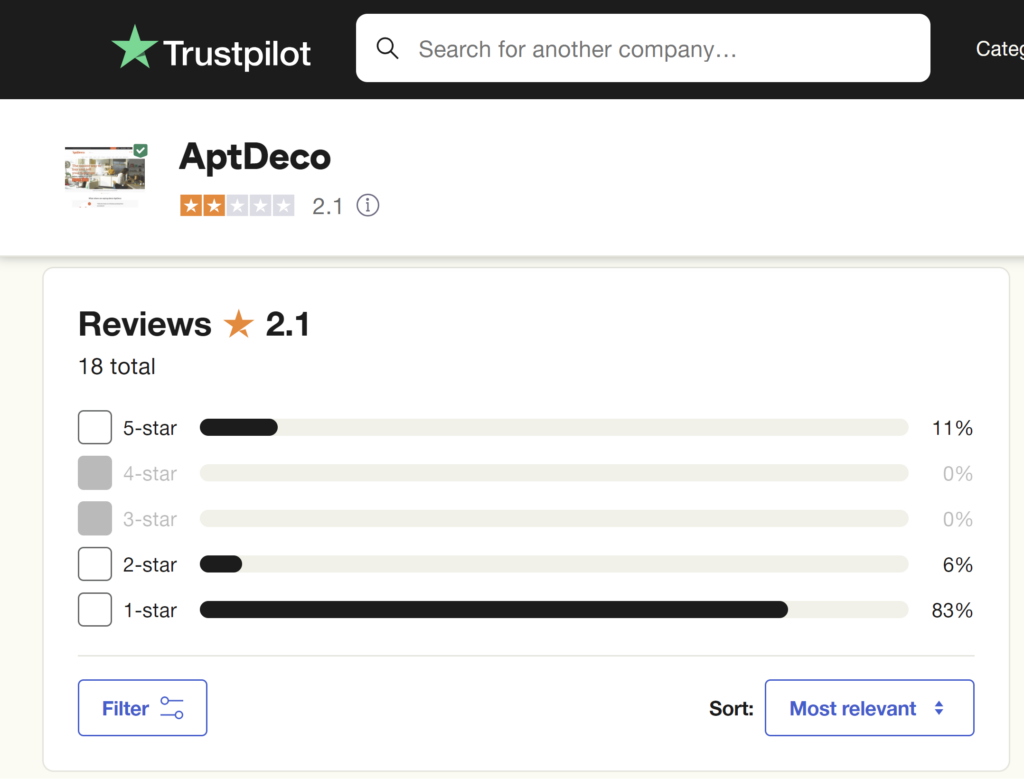AptDeco’s Phygital Platform for Sustainable Interior Design

Sell your furniture in 10 days or less, guaranteed (almost)!
AptDeco “is a peer-to-peer managed marketplace dedicated for buying and selling quality used furniture.” It was established in 2014 after one of the co-founders had an unsafe experience trying to sell a TV on Craigslist. The co-founders realized there were plenty of options available for people to buy and sell home goods (Facebook Marketplace, Craigslist, consignment shops, and furniture stores to name a few), but there was no solution that currently met all their requirements on both sides of the transaction: a solution that is easy, safe, fast and sustainable.1 By hosting an online platform that is free to use and managing white-glove delivery services, AptDeco hopes to take advantage of cross-side network effects in order to grow quickly.

The platform captures value from users in two ways: 1) charging sellers a commission on every transaction and 2) charging delivery fees depending on the size of items purchased. Commission rates are up to 48%, while shipping and delivery fees are based on item size and location and could be paid by the buyer or the seller. By physically disconnecting the two sides of the transaction and managing the delivery logistics, AptDeco also delivers on its safety value proposition. Because many online marketplaces don’t charge a fee to sellers to post items, multi-homing is a strong possibility. AptDeco differentiates itself by claiming a speedy sale, saying sellers can “list [their] furniture in 2 minutes and sell in 10 days,” which can be valuable to people who need to get items out of their space quickly.

AptDeco’s business doesn’t solely rely on network effects; they operate on an asset light model which helps keep costs low. For example, no inventory is owned or stored by the platform and they don’t utilize any retail space, leveraging their digital store front for customer interactions. The only physical assets the company has are their delivery vans which also operate as mobile billboards. In addition to advertising, AptDeco benefits from their physical delivery service because they can control the end-to-end customer experience. Initially, the platform outsourced delivery to 3rd parties, but based on early customer feedback, the founders pivoted to in-house logistics for more control.2
AptDeco began by launching operations first in New York City and then the tri-state area. New York has a high population of potential customers who move to new living spaces quite frequently; this made them not only potential buyers, but also potential sellers, enabling one user to exist on both sides of the platform. In addition, many residents don’t have cars, which affirmed the need for pickup and delivery services. Finally, a significant portion of people in the city rely on the subway system for daily transportation which gave AptDeco an easy way to advertise. The platform grew quickly, around 30% week-over-week growth in 2014.
After proving that the business model worked in New York, AptDeco looked to grow quickly to new geographic regions by launching in Washington, D.C. This endeavor was not the success they hoped it to be, in part because users could not transact on items between the two locations.3 This severely limited the impact of the network effects and ruined the customer experience. It wasn’t until AptDeco opened their business model and allowed for shipping anywhere within the contiguous US that they again benefited from cross-side network effects.
However, with this growth came challenges. AptDeco is no longer able to manage all shipping and delivery and has outsourced part of this to third parties. This limits AptDeco’s touchpoint with the customer to only the online platform, which could make it challenging to manage the customer experience and harm retention rates. Current reviews of the service on Trustpilot have AptDeco at just 2.1 stars with most of the negative experiences having to do with shipping or delivery.

In addition, its questionable whether network effects are strong enough to offer a sustainable competitive moat. Given that the expected number of transactions per user is low (since people don’t buy new furniture that often), the platform must rely on a large acquisition funnel to win users. This, coupled with the threat of multi-homing by sellers, reduces the impact of networks effects and could limit the long-term viability of AptDeco. To combat this issue, they could implement a loyalty or referral program or even a social aspect (like an interior design contest through Instagram). This could enable the platform to leverage not just cross-side network effects, but same-side as well by bringing users closer together and encouraging retention.
Citations
- Ayelet Israeli and Jamie Merkrebs, “AptDeco: Circular Economy Furniture Marketplace,” HBS No. 9-521-069 (Boston: Harvard Business School Publishing, 2021).
- IBID, p6.
- IBID, p8.



The prospect of loyalty programs at AptDeco is intriguing, given the platform’s transactional nature, where users may buy or sell once and not return for some time. A creative solution could be to reward engagement beyond purchases, such as referrals or community participation, fostering a sense of connection that encourages even one-time users to remain involved with the platform (like the Instagram contest idea!).
Great post! I’m curious about the business model sustainability as AptDeco considers expanding to other locations. New York has the advantage of being rather condensed as a city, so I can imagine “speedy” delivery being easier to achieve as a part of their value proposition. However, if they expand to cities that have a greater radius distance-wise, could they still achieve their targets without impacting customer service? Especially with the push towards using 3rd party delivery systems, I wonder if the strategy team should be concerned.
It’s an interesting company, and I remember that I almost used them when I used to live in NYC, but the negative reviews threw me off. The service that they provide is indeed valuable, especially in dense urban areas where transporting the furniture may actually be the most difficult part of the process. However, to your point, to truly leverage their network, they need to make the inventory available nationwide, and that just feels like such a heavy undertaking, especially for a smaller player in the space. I imagine quality assurance might also be a big problem with them- most of the used furniture I’ve bought have had chips, cracks, or defects in some way, and while many platforms allow you to inspect the piece in person before finalizing the deal, AptDeco essentially asks you to buy the item sight unseen, and once it’s delivered, it’s probably too late to price adjust. If done right, it can deliver fantastic value to all parties on the platform (just look at how Craigslist has persevered, even though they don’t really have any value add services), but in some ways, it just feels like a tough market to play in because of the unpredictable nature of the underlying goods.
I am SUCH a HUGE fan of this company. But interestingly, I’ve never bought items on the platform for a similar reason to David-bad review;I’ve used it only for apartment styling advice. That’s a testament I think to the platform’s influence over me (and a lot of millennials) that isn’t particularly monetizable.